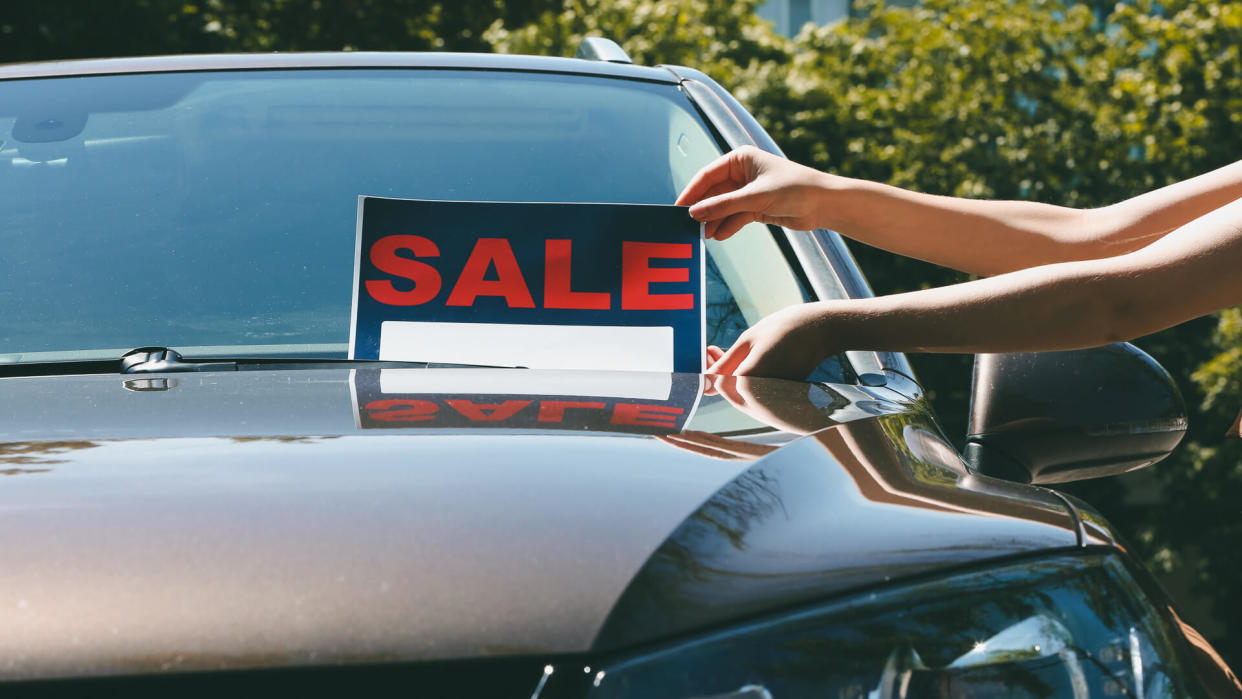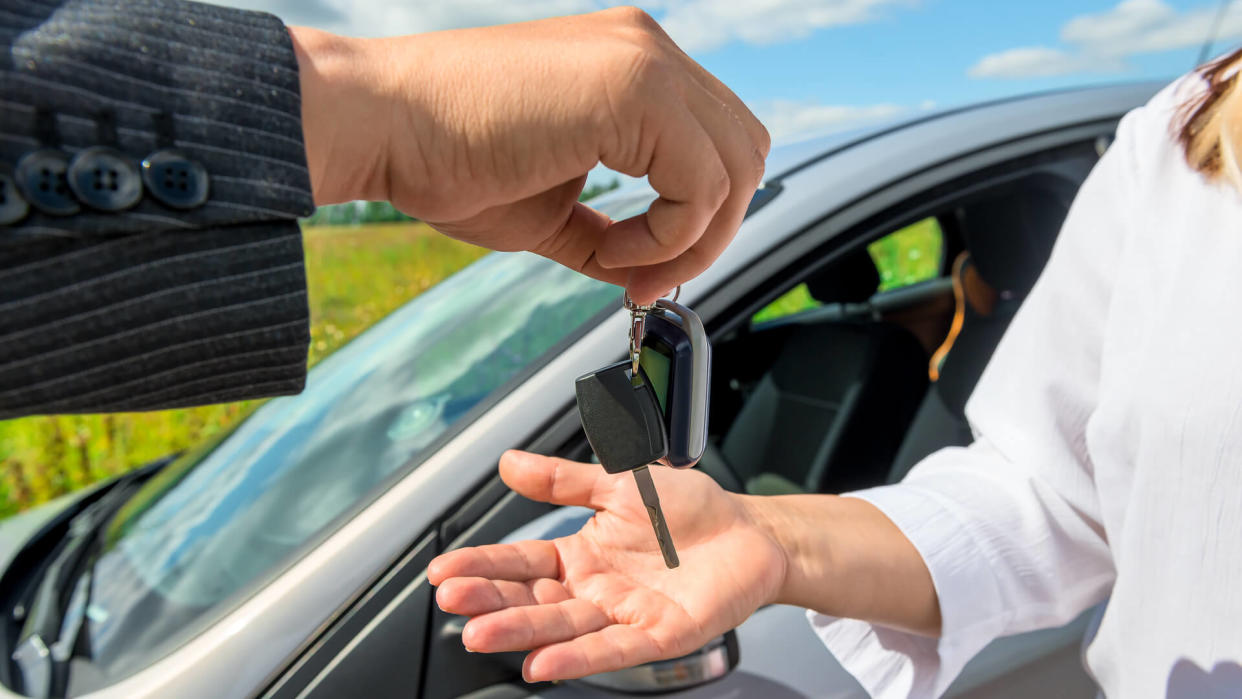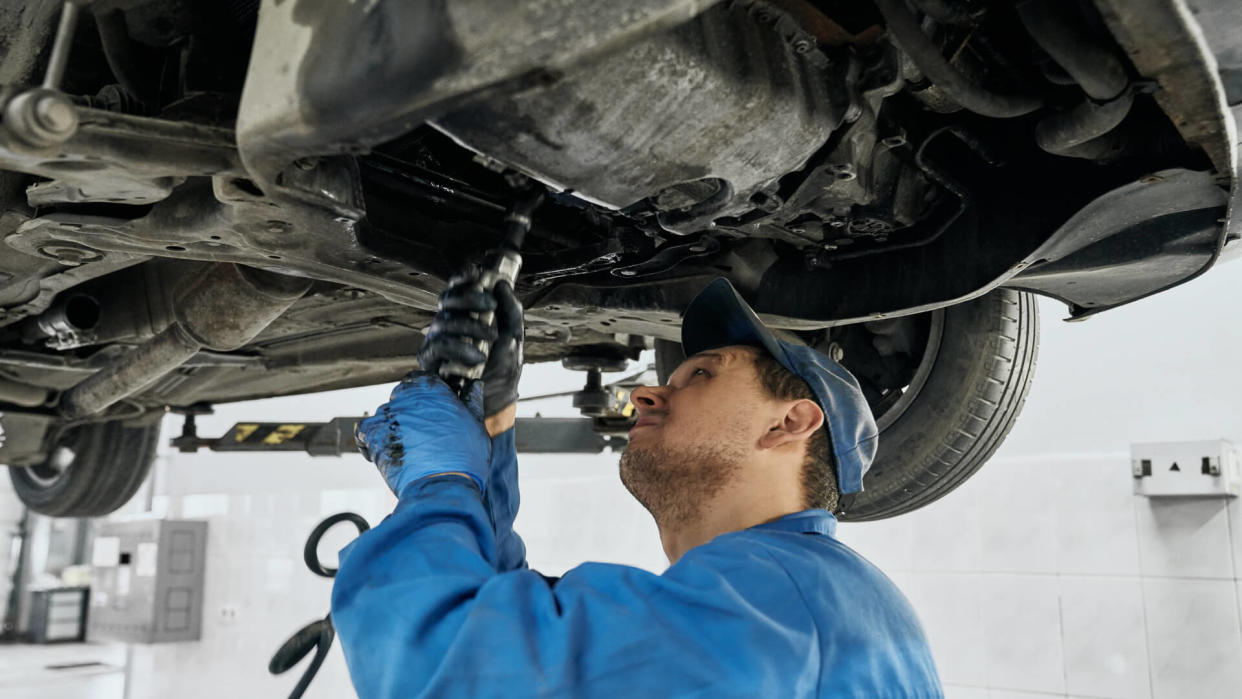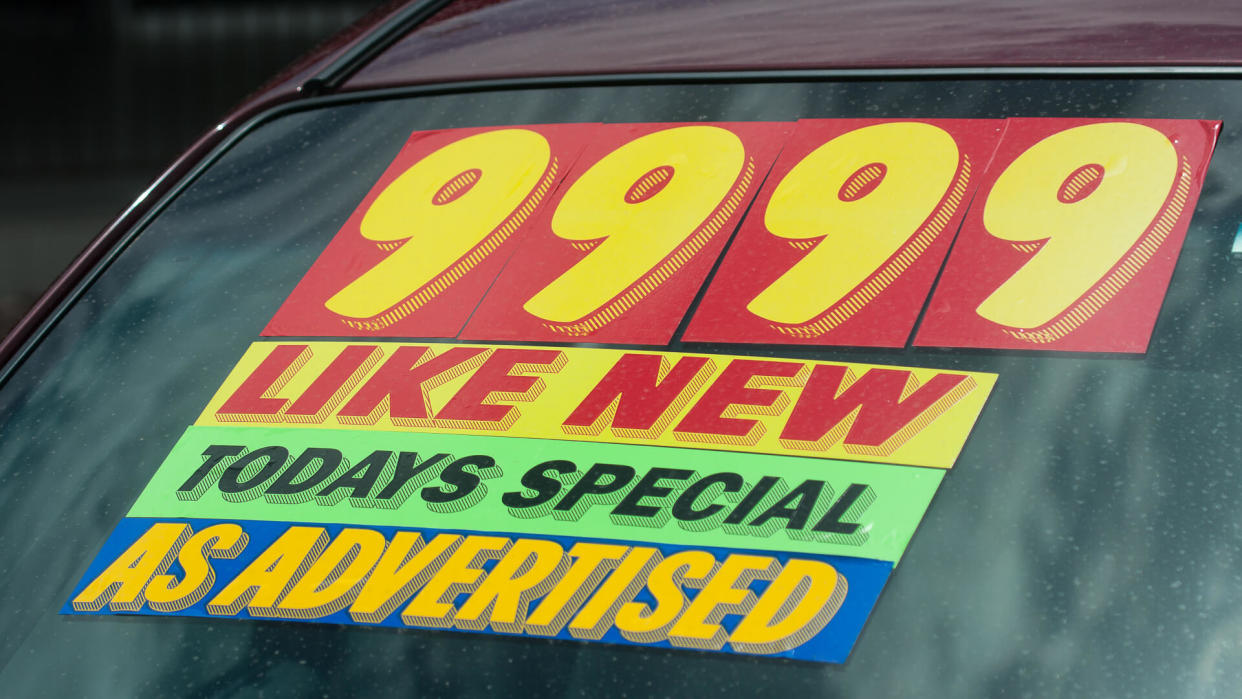12 Used Car-Buying Scams To Watch Out For — and How To Avoid Them
Purchasing a new car is a pretty straightforward affair. Buying used, however, requires you to do much more legwork to make sure you’re getting a good car and a good deal — and that you’re not falling for one of the many scams that fraudsters use to rip off buyers. Some of the following scams are used on their own, but many other times criminals utilize several of them at the same time. The good news is, you can protect yourself and avoid falling victim to predatory sellers.
Last updated: June 4, 2020
1. The Must Sell Now Scam
The FBI recently updated a longstanding warning to be on the lookout for a scam that cost car buyers more than $54 million between 2014-2017. Criminals post false ads that feature pictures of real cars — cars that they don’t own or even possess — that they claim to be selling at a steep discount because they have to sell fast. Sometimes they claim they were called for military deployment. Other times they’re going through a divorce or that it belonged to a loved one who died. Either way, you have to give at least a partial payment upfront if you want to get in on the deal. Once the payment is made, the seller disappears into the wind.
How You Can Avoid It
The secret to avoiding this scam can go a long way to protecting you from all used car scams and all fraud in general — use common sense. If the price is well below market value and if the deal seems too good to be true, it almost always is. If a seller you’ve never met asks for payment in advance, walk away.
2. The Third-Party Scam
Criminals who run that scam and many others often try to legitimize their ruses by faking partnerships with reputable third-party organizations like eBay Motors. They have no real affiliation with these trusted platforms, although they assure their victims the platform will oversee the transaction. They’re known to offer fake toll-free phone numbers and high-quality mimic websites that impersonate the third-party to put their targets at ease.
How You Can Avoid It
Criminals using this scam work hard to fabricate their relationships with trusted third parties. Never rely on the website, email address or phone number supplied by the seller. Instead, look up the company online, find its contact information on your own, and reach out to them yourself.
Be Aware: Don’t Fall For One of the ‘Dirty Dozen’ Tax Scams
3. Gift Card Scam
Another hallmark of many scams targeting used car buyers is a request for gift cards as payment. When the buyer calls the fake toll-free number, they’re told to purchase gift cards in the amount of the sale price they agreed to and turn the prepaid gift card codes with the imposter seller. This kind of payment is virtually untraceable, which is the only reason they request it — after all, what legitimate seller would prefer that over cash?
How You Can Avoid It
Never pay with an alternative currency that can’t be traced. According to the Federal Trade Commission, “If anyone tells you to pay that way, it’s a scam. Every time.” This holds true not only for gift cards but for digital currency like Bitcoin. Your bank and credit card providers offer fraud protection and other security services. When you deviate from those platforms, you open yourself to losing the entire payment to scammers.
4. Wire Transfer Scam
Like gift cards, wire transfer requests are a hallmark of many commonly used car scams. The point is the same — to get their victims to submit a hard-to-trace payment without having received a vehicle. Here, too, the scam is often backed up by fraudulent but seemingly legitimate third-party organizations.
How You Can Avoid It
You can avoid this and most other scams by not paying for a car that you don’t have in your possession. Scammers will offer all kinds of reasons why they can’t deliver the vehicle or allow you to pick it up until they receive a wire transfer. Don’t fall for it. In fact, there’s no reason you should have to pay via wire transfer in the first place — doing so makes it easier for scammers to take the money and run and harder for you to ever track them down or get your money back. Wire transfers are only for people who you know and trust.
Know: 25 Things You Should Always Do Before Buying a Used Car
5. Purchase Protection Plan Scam
Legitimate companies like eBay Motors offer a vehicle purchase protection plan with some of the vehicles sold through their platform. The program protects buyers from fraud and holds sellers accountable. Some scammers try to set their victims at ease by faking a relationship with companies that offer purchase protection services, complete with imposter phone numbers, email addresses and websites.
How You Can Avoid It
Here, too, the key to protecting yourself is to do your own research. Never trust contact information from the seller regarding a purchase protection program. Instead, find the company’s true contact information online and contact them yourself. This is true no matter how authentic the website or email looks.
6. Escrow Scam
Another way scammers get their victims to lower their guards and pay in advance is by creating a fake escrow account. Legitimate buyers and sellers often park good-faith payments in third-party escrow accounts until the conditions of the sale have been met by both parties. This tactic can snare buyers who are rightfully leery of wiring money directly to sellers they’ve never met before they receive the vehicle. The problem is, there is no escrow account and the money goes directly to the scammer who then disappears with the cash.
How You Can Avoid It
Never pay in advance, even if the payment goes to a supposedly legitimate escrow service. Go through the regular motions of meeting the seller, examining the car, having it inspected, and then negotiating a price and completing the sale. Escrow scams are especially common with custom, specialty or exotic cars, particularly those that are offered well below market value.
Read More: The Biggest Money Scams of All Time
7. Curbstoning
Curbstoners, as these types of scammers are called, can be either shady private sellers or unscrupulous dealers. The practice involves luring prospective buyers to open spaces not associated with businesses or residences like a parking lot or the curbside of a road, which is where the name comes from. The goal is to sell salvaged or damaged cars to buyers who think they’re getting a good deal. The cars are dressed up cosmetically to conceal dangerous flaws like missing airbags or unsafe frame welding, which would disqualify them from sale on the open market. These sales are illegal and frequently end with the driver leaving without the title or other critical paperwork.
How You Can Avoid It
Curbstoners find their marks through online ads on sites like Craigslist or simply by placing “for sale” signs on parked cars — and they usually try to offload multiple cars at the same time. Conduct an online search for any listed phone numbers to see if they’re associated with any other vehicle sales or ads. If they are, it’s likely the work of a curbstoner. Another method is to call the number and say you’re calling to inquire about the car. If whoever answers asks which car you’re talking about, that means multiple cars are linked to the same number and it’s likely a scam. Also, curbstoners always demand cash and won’t accept a check or money order because their goal is to eliminate a paper trail.
8. Title Washing
The title washing scam conceals or erases salvage brandings that serve as a warning on titles for cars that insurance companies have deemed to be a total loss after events like an accident or flood. They achieve this by transferring salvage vehicles to states where the automaker’s brand isn’t recognized. When the state issues a new title, the salvage branding can disappear — if not, the seller often tries again in another state.
How You Can Avoid It
Scammers can wash a title, but they can’t wash computer records. To avoid this scam, which could leave you with a car that’s worthless or dangerous, do something you should do with every used car purchase anyway — run a VIN check. Services like Carfax will reveal a vehicle’s salvage status. Keep in mind that both private sellers and dealers have been known to run this scam.
Watch Your Money: 8 Scams That Get To Your Paycheck Before You Do
9. Odometer Fraud
The National Highway Traffic Safety Administration (NHTSA) estimates that 450,000 cars are sold with manipulated odometer readings every year at a cumulative cost of $1 billion in annual losses. The odometer tallies the number of miles driven, one of the key indicators of any car’s value. Altering, resetting or otherwise misrepresenting the true readout is illegal, but it happens all the time, often without the buyer ever knowing.
How You Can Avoid It
To protect yourself, start by inspecting the title closely. The stated mileage should match the odometer readout. If the mileage on the title is smudged or obscured, there might be a problem. Look for evidence of tampering with the odometer and make sure that it records miles when you test drive it. Here, too, a VIN report from a service like CarFax can give you the true story of the car’s mileage. If the amount of wear and tear on the car seems excessive for the mileage the odometer indicates, walk away.
10. The 'Just Needs' Scam
This scam defrauds buyers through ads that offer a car for sale that’s in perfect working condition, but “just needs” something that’s fairly cheap and easy to replace like freon or a new alternator. The buyer purchases the vehicle and makes the needed repair, only to find out that the stated problem was just the tip of the iceberg. The addition of freon, for example, might not fix the air conditioner because a much larger repair like a new compressor was needed or that the alternator was just one part of a larger problem with the electrical system.
How You Can Avoid It
The phrase “just needs” is usually a code for “the entire system doesn’t work.” Avoid these vehicles with almost no exceptions. Common sense is key. If a seller could get thousands more for a vehicle by spending a few hundred dollars on a simple part to get the car into good working condition, why would they skip that step and sell it for much less?
11. Car Cloning
Car-cloning is a sophisticated scam where criminals use stolen VIN numbers and fraudulent documents to make a stolen car appear to be legitimate. It can be hard to detect and the stakes are high. If your car’s true identity is discovered, authorities will confiscate it and you could even face criminal charges.
Find Out: Don’t Answer the Phone! How Americans Have Lost Millions to Scammers
How You Can Avoid It
The National Motor Vehicle Title Information System (NMVTIS) is a service provided by the U.S. Department of Justice. Before you purchase a car, run its VIN number and its title information through the NMVTIS system, which is free to use. It will tell you if the car doesn’t match its VIN number or associated paperwork.
12. Deposit Fraud
Deposit fraud is simple and effective. The seller lists a car for less than it’s worth to attract eager buyers. When buyers contact the fraudsters, they ask for a significant deposit to take the car off the market, presumably because so many other buyers want to get their hands on the discounted vehicle. Once the buyer leaves a deposit, the seller disappears and stops responding.
How You Can Avoid It
Avoid deposit fraud by not making a deposit in the first place. There might be an exception in a case where you’ve met the seller, seen the car and established the seller’s identity. In those rare cases, never agree to a large deposit and always get a receipt.
General Tips To Avoid Fraud
If you’re shopping for a used car, you can be sure that scammers are baiting traps for you and your wallet. The following tips will help you avoid the pitfalls of used car fraud no matter how crafty the scammers are:
Use common sense and listen to your gut — if something feels fishy or if a deal seems too good to be true, it probably is.
Try to deal with local sellers only and never deal with a seller who refuses to meet in person.
Research the buyer, including their name, email address and phone number.
Research the car, including a Carfax report and a trace on the NMVTIS database.
Be leery of sellers who try to rush the sale.
Never trust a seller who claims a vehicle is guaranteed by eBay Motors, PayPal or any other online marketplace.
Never pay in advance and never send money through a bank-to-bank or wire service transaction.
More From GOBankingRates
This article originally appeared on GOBankingRates.com: 12 Used Car-Buying Scams To Watch Out For — and How To Avoid Them

























